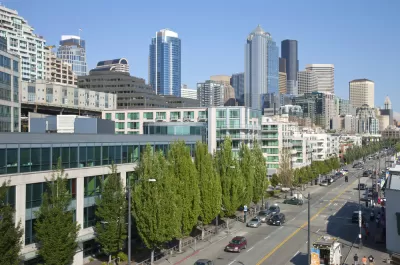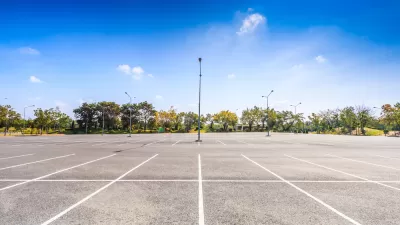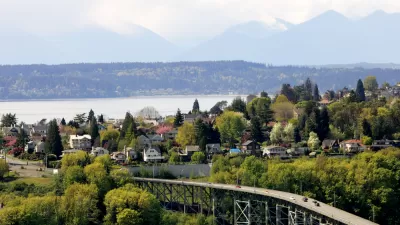Seattle is one of the U.S. cities shrinking minimum parking requirements to allow for denser, more affordable development near transit.

An oversupply of parking in U.S. cities has grave unintended consequences, directly leading to "higher housing costs, inefficient land uses, and more vehicle ownership and driving. As such, oversupplying parking harms the environment, reduces housing affordability, and thwarts efforts to improve social equity," C.J. Gabbe, Gregory Pierce, and Gordon Clowers say.
The writers explain a case study in Seattle, where after parking minimums were reduced in 2012, the city was seemingly able to increase housing development projects and encourage modes of transportation other than the automobile. The minimum requirement reduction, in line with the city's comprehensive plan, eliminated on-street parking for multifamily housing in dense urban areas, and dramatically decreased minimums for areas in close proximity to transit options.
Gabbe, Pierce, and Clowers conducted research to determine if developers built less parking in the areas with reduced requirements. Studying 60,361 housing units between 2012 and 2017, the researchers found that developers did, in fact, build less parking when requirements were reduced.
"About two-thirds of the projects we examined — mainly those in the downtown and its densest surrounding urban centers — were not required to provide any off-street parking. Most buildings in our sample provided less than one parking space per unit, and a sizable share, nearly 20%, provided no parking at all," the team writes. "Our results show that (1) minimum parking requirements often constrain developers, and (2) reducing those requirements leads to less parking, which presumably means cost savings for developers and lower housing prices for consumers."
When developers are forced to comply with excessive parking requirements, the researchers point out, they lose out on space and funds that could be used to build commercial or residential units. According to Gabbe, Pierce, and Clowers, less parking could mean more housing, and in turn, less incentive for automobile reliance.
FULL STORY: How Developers Respond to Parking Reform

Montreal Mall to Become 6,000 Housing Units
Place Versailles will be transformed into a mixed-use complex over the next 25 years.

Planetizen Federal Action Tracker
A weekly monitor of how Trump’s orders and actions are impacting planners and planning in America.

DARTSpace Platform Streamlines Dallas TOD Application Process
The Dallas transit agency hopes a shorter permitting timeline will boost transit-oriented development around rail stations.

Chicago Judge Orders Thousands of Accessible Ped Signals
Only 3% of the city's crossing signals are currently accessible to blind pedestrians.

Philadelphia Swaps Car Lanes for Bikeways in Unanimous Vote
The project will transform one of the handful of streets responsible for 80% of the city’s major crashes.

Interactive Map Reveals America's “Shade Deserts”
Launched by UCLA and American Forests to combat heat-related deaths, the tool maps the shade infrastructure for over 360 U.S. cities.
Urban Design for Planners 1: Software Tools
This six-course series explores essential urban design concepts using open source software and equips planners with the tools they need to participate fully in the urban design process.
Planning for Universal Design
Learn the tools for implementing Universal Design in planning regulations.
City of Mt Shasta
City of Camden Redevelopment Agency
City of Astoria
Transportation Research & Education Center (TREC) at Portland State University
US High Speed Rail Association
City of Camden Redevelopment Agency
Municipality of Princeton (NJ)





























